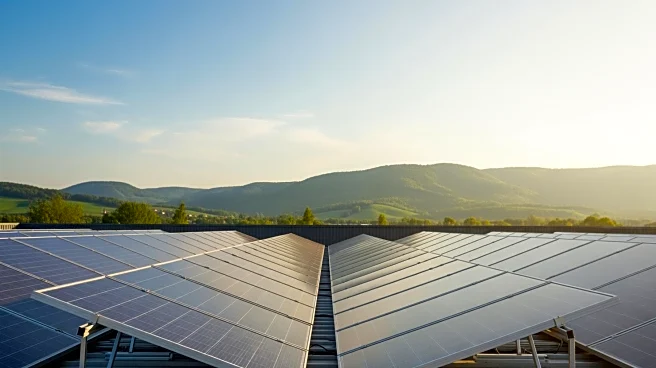What's Happening?
The Ohio House has passed House Bill 303, which establishes the Community Energy Pilot Program. This initiative aims to create up to 1,500 megawatts of small-scale energy facilities across the state, including
renewable sources like wind and solar, as well as fossil fuel options such as natural gas. The program is designed to allow local residents and businesses to invest in nearby energy generation projects, receiving monthly credits on their electric bills. The Public Utilities Commission of Ohio will regulate these facilities, although any expansion beyond the initial 1,500 megawatts will require legislative approval. The bill has garnered support from solar and conservation advocates, while facing opposition from entities like Edison Electric Institute and American Electric Power. The program is part of a broader effort to address the increasing demand on the state's energy grid, particularly from power-intensive consumers like data centers.
Why It's Important?
The Community Energy Pilot Program represents a significant shift in Ohio's approach to energy generation, emphasizing local involvement and renewable energy sources. By allowing communities to invest directly in energy projects, the program could lead to increased energy independence and potentially lower costs for consumers. This initiative also aligns with broader trends towards sustainable energy solutions, which are crucial as the state faces growing pressure on its energy grid. The program's success could serve as a model for other states looking to balance energy demands with environmental concerns. However, the opposition from major energy companies highlights the ongoing debate over the best path forward for energy policy, with implications for industry stakeholders and environmental advocates alike.
What's Next?
The bill now moves to the Ohio Senate for consideration. If approved, the program could begin implementation, with the Public Utilities Commission of Ohio overseeing the establishment of community energy facilities. The outcome of the Senate's decision will be closely watched by both supporters and opponents of the bill, as it could set a precedent for future energy policy in the state. Additionally, the program's impact on rural areas, which House Speaker Matt Huffman noted could benefit most, will be an important aspect to monitor. The legislative process may also involve further negotiations and amendments, particularly concerning the balance between different types of energy generation.









